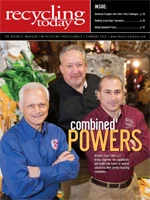|
|
A January Wall Street Journal article reports on the practice of “showrooming.” This involves a retail shopper inspecting merchandise—and perhaps taking a photo with a smart phone—and then proceeding to buy a similar or identical item online. Brick and mortar retailers are not enamored of this behavior. I’m not entirely sure whether the recycling industry offers an example of a similar practice. Without question, though, photos of scrapped items and secondary commodities have become far more widespread in the past 10 years for a number of reasons. Metals theft has been one boon to the digital photography industry. Police in many state, county and municipal jurisdictions now require photos of loads of scrap metal, the vehicle delivering the scrap, the person driving that vehicle or some combination thereof. Coupled with this photo frenzy on the buy side has been the increased transmission of digital photos on the sell side, whether because it is required by agencies such as China’s General Administration of Quality Supervision, Inspection and Quarantine (AQSIQ), or whether the buyer and seller agree that sending a photo is the best way to prevent a misunderstanding. One would like to think that, if a picture is truly worth a thousand words, some of this newly created photographic effort is saving time, money and effort for traders of secondary commodities. And while, on the sell side, it may be a different form of communication than the telephone conversations that traders have relied on far longer, it remains part of a wider platform through which buyers and sellers maintain long-standing relationships that allow them to trade with the people and companies with whom they’re most comfortable. In fact it seems more than likely that somewhere out there a buyer and seller have forged a better relationship in large part because one party admires the other’s consistently high-quality and accurate photographs! Scrap processors and traders ultimately have to decide for themselves whether the digital photo proliferation has on balance been bad or good, but it seems to have quickly become an important part of the business.
Recycling Today is pleased to welcome Lisa McKenna as the newest member of the editorial staff of the Recycling Today Media Group. Lisa has written for business trade publications for more than 15 years and has earned a master’s degree in journalism from Northwestern University, Evanston, Ill. She is joining the media group as managing editor of the Recycling Today Global Edition publication, though readers of Recycling Today also will begin to notice her contributions immediately. |

Explore the February 2012 Issue
Check out more from this issue and find your next story to read.
Latest from Recycling Today
- Aqua Metals secures $1.5M loan, reports operational strides
- AF&PA urges veto of NY bill
- Aluminum Association includes recycling among 2025 policy priorities
- AISI applauds waterways spending bill
- Lux Research questions hydrogen’s transportation role
- Sonoco selling thermoformed, flexible packaging business to Toppan for $1.8B
- ReMA offers Superfund informational reports
- Hyster-Yale commits to US production






